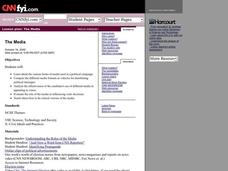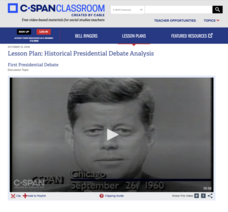iCivics
Mini-Lesson: Gerrymandering
Who determines the structure of voting districts? The concept of gerrymandering brings to light the ongoing issue of how those running for office gain votes. Hands-on activities enable scholars to analyze the re-drawing of voting...
Encyclopedia Britannica
Candidate Flip-Flop or Evolution?
Beware political rhetoric! Connotation is everything! Groups select a presidential candidate and investigate how the candidate's position has changed on a specific issue. After analyzing the situation, the group determines whether they...
Curated OER
The Media
Students identify various forms of media used in a political campaign and compare the different formats as vehicles for distributing political messages. They analyze the effectiveness of candidate's uses of different media.
Curated OER
Choose or Lose: The Electoral Process
Students examine the local and national election process. In groups, they brainstorm a list of the issues important to them and compare them to an overall list of issues present in the election. They analyze graphs and complete...
Carolina K-12
Active Citizenship in After School
Active citizenship is the bedrock of any great democracy. Continue the trend by teaching the next generation about voting rights and the functions of elections in society. The variety of activities in the resource includes a human...
PBS
Alexander Hamilton: Lawyer, Writer, and Founding Father
Scholars analyze the impact Alexander Hamilton had on the creation of the United States. Primary documents and video clips give learners a glimpse into the life of one of America's Founding Fathers, arming them with enough information to...
iCivics
Mini-Lesson: Presidential Succession
Who is in line for the presidency? Learners research the line of succession in the executive branch. They analyze the role the cabinet plays in a situation where the president and vice president are not able to serve. Along the way,...
Newseum
Disinformation Nation: Is It Propaganda?
Propaganda or not? That is the question researchers must answer as they analyze techniques used in ads. Pupils use a three-part definition to determine if the ad is propaganda or advertising.
Curated OER
They Were Born Where?
Students assess where the presidents of the United States were born and analyze the role of geography in determining the outcome of presidential elections. They create graphs visualizing the birth and home states of the presidents along...
Curated OER
US Presidents
Students work in small groups to analyze various presidential campaigns. For this presidential election lesson, students research election rules, candidates, and winners from 1900 to 2000. Students will create and present an oral report...
Curated OER
Shifting Wins
Students analyze how the outcome of the 2002 midterm elections changed the balance of power in the government. They write a news analysis and evaluation of how the nation be governed in the future.
Curated OER
YOUR OWN CAMPAIGN
Twelfth graders, in groups propose a new law and design a campaign to get people to vote for their law. They have a voter's forum and hold a mock election.
Curated OER
Campaign 2000
Learners research newspapers and the Internet to learn about the election. Students work in groups and choose a state that they want to compare to Florida. Learners organize the data they have found into a graph labeling an "x" and "y"...
Curated OER
Rocking the Vote
Students explore how a presidential candidate can win the popular vote but not receive enough electoral votes to win the election. They analyze various regions' voting trends, explore how these trends reflect the outcome of the 2004...
Curated OER
Magnetic Polls
Students explore the New Hampshire primaries and the polling process by analyzing polling information, examining the effects of polls, and creating graphs that represent polling data.
Curated OER
Lights, Camera, Campaign
Students employ their technology skills to produce campaign commercials. In this political campaign lesson, students discover the appropriate uses of video cameras and create fictitious campaign commercials.
Curated OER
The 1860 Election in Pennsylvania
Young scholars examine the political parties of the 1860 election and compare their platforms. For this election lesson young scholars determine the meaning of a political cartoon and predict the outcome of the 1860 election.
Curated OER
Government
Eighth graders analyze purposes of government, examine importance of citizenship to individuals and society at large, explain structure and functions of three branches of federal government, cite roles/duties, qualifications, and terms...
Curated OER
Electronic Elections
Students evaluate the role of voting in democratic societies and the potential of voting on the Internet.
C-SPAN
Presidential Debate Analysis
The modern presidency is defined by the development of television—including the use of televised debates in the campaign. Using debates going back to the first one between John F. Kennedy and Richard Nixon, young scholars evaluate...
C-SPAN
Polling and Public Opinion
Most people are eager to offer their opinions about topics of interest, but what's the most effective way to collect and assess these opinions as a matter of fact? High schoolers learn about the history of polling, as well as the...
PBS
What Are the Primaries and Caucuses?
What are the essential differences between primaries and caucuses? As part of a study of the process by which Americans select their candidates for US president, class members examine the nominating process, the changes that have...
Facing History and Ourselves
Laws and the National Community
When it comes to the law, is justice always served? Teach scholars about how law sometimes enables prejudice of entire groups of people with a unit on World War II that includes a warm-up activity, analysis of primary sources,...
Curated OER
Electoral College
Eleventh graders discover how the Electoral College works. In this presidential elections instructional activity, 11th graders compare and contrast the Electoral College and popular vote as they participate in a classroom simulation....

























